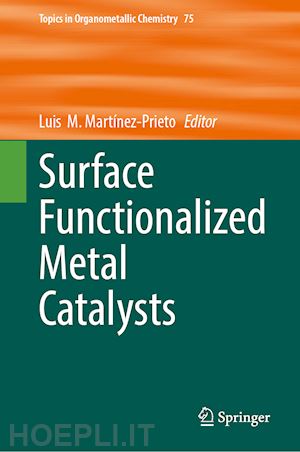

Questo prodotto usufruisce delle SPEDIZIONI GRATIS
selezionando l'opzione Corriere Veloce in fase di ordine.
Pagabile anche con Carta della cultura giovani e del merito, 18App Bonus Cultura e Carta del Docente
This book covers recent advances in the field of surface functionalized metal catalysts. It not only explores novel catalysts based on metal nanoparticles immobilized on functionalized supports, but also provides an overview of the latest developments in the study of the influence of capping ligands on metal nanoparticle catalysis. Catalysis with surface functionalized metallic systems is attracting significant interest due to the possibility to precisely control the reactivity of surface active sites. Controlling the synthesis, characterization and application of these catalysts offers new possibilities to classical heterogenous catalysis.
Metal Nanoparticles on Molecularly Modified Surfaces and their Application in Catalysis.- Metal Nanoparticles on Polymeric Membranes Applied in Catalytic Hydrogenations.- Influence of Capping Ligands on Metal Nanoparticle Driven Hydrogen Evolution and CO2 Reduction Reactions.- N-Heterocyclic Carbene Modified Metal Nanocatalysts.- Metal Nanoparticles Functionalized with Hydrosoluble Ligands.- Organometallic Nanoparticles for Magnetically Induced Catalysis in Solution.- Ligand capped heterogeneous catalysts from groups 8 -10.
Dr. Luis M. Martínez-Prieto received his PhD degree in Organometallic Chemistry in 2012, working at the IIQ – “Instituto de Investigaciones Químicas” (Seville, Spain) on Ni and Pd pincer complexes under the supervision of Prof. J. Cámpora. He then moved to the LCC - “Laboratoire de Chimie de Coordination” (Toulouse, France) for a postdoctoral stay in the group of Prof. B. Chaudret. His research focused on the synthesis, characterization and study of the surface chemistry of metal nanoparticles (MNPs). In 2015, he joined the LPCNO – “Laboratoire de Physique et Chimie des Nano-Objets” (Toulouse, France), exploring the use of MNPs as catalysts in the lab of Prof. P. van Leeuwen. In 2017, he was awarded with a “Juan de la Cierva” fellowship that allowed him to start an independent career working on confined/supported metal catalysts and magnetically induced catalysis at the ITQ – “Instituto de Tecnología Química” (Valencia, Spain), in the team of Prof. A. Corma. In 2022 he was selectedas “Ramon y Cajal” researcher and started a new stage as independent scientist in his alma mater, the University of Seville. He is now Tenured Scientist of CSIC at IIQ (Seville, Spain) and team leader of “CataNa” group, focused on metal nanoparticle catalysis.











Il sito utilizza cookie ed altri strumenti di tracciamento che raccolgono informazioni dal dispositivo dell’utente. Oltre ai cookie tecnici ed analitici aggregati, strettamente necessari per il funzionamento di questo sito web, previo consenso dell’utente possono essere installati cookie di profilazione e marketing e cookie dei social media. Cliccando su “Accetto tutti i cookie” saranno attivate tutte le categorie di cookie. Per accettare solo deterninate categorie di cookie, cliccare invece su “Impostazioni cookie”. Chiudendo il banner o continuando a navigare saranno installati solo cookie tecnici. Per maggiori dettagli, consultare la Cookie Policy.